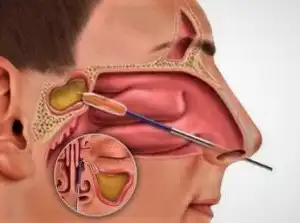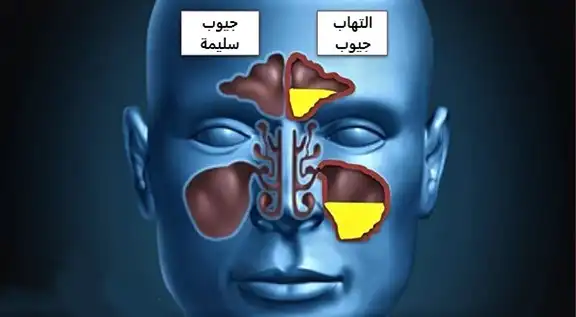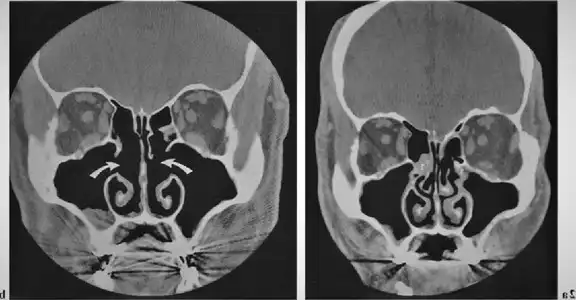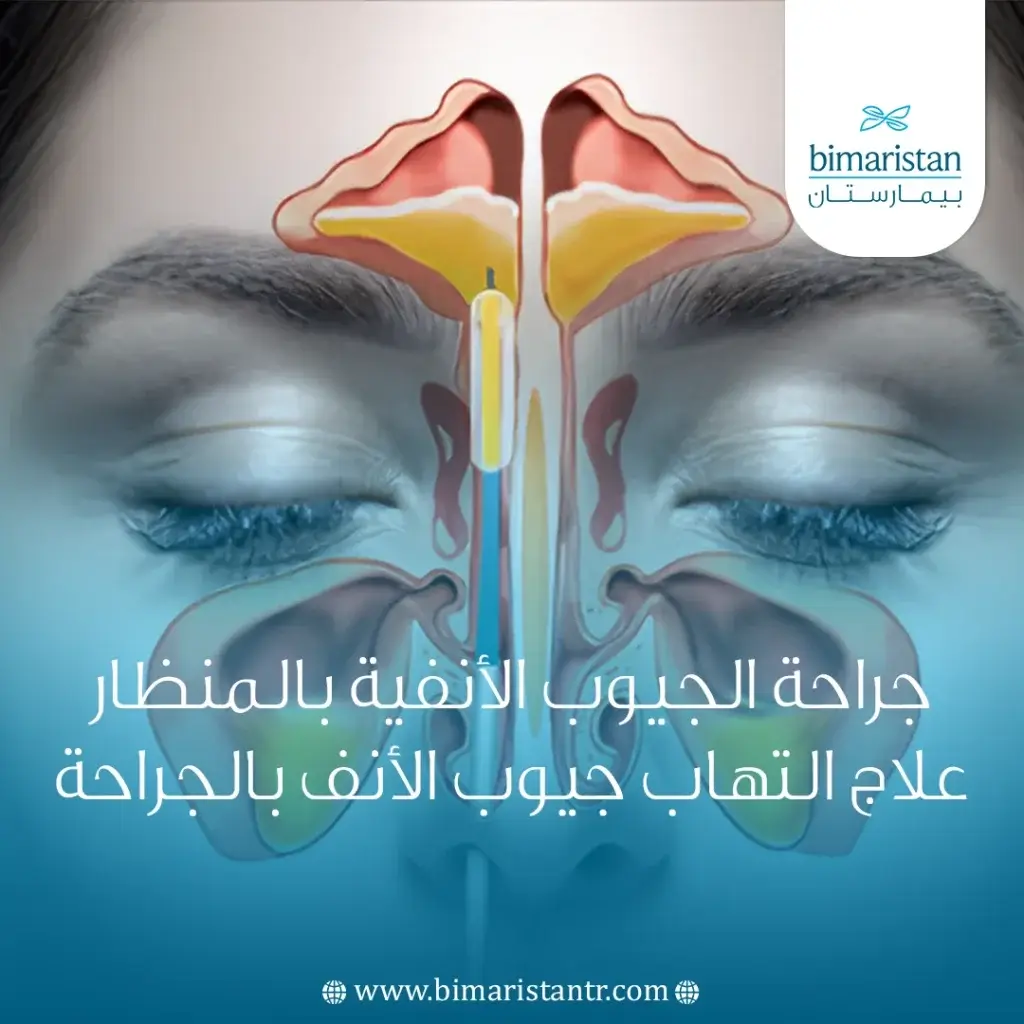جراحة الجيوب الأنفية بالمنظار يستخدم هذا الإجراء لعلاج التهاب الجيوب الأنفية المزمن واستئصال أورام الأنف الحميدة، كما تجرى بهدف توسيع مسارات تصريف الأنف للجيوب الأنفية و لتحسين التهوية، تعرف أكثر على هذا الإجراء في تركيا، وكيفية التحضير له .
لماذا يتم إجراء عملية الجيوب الانفية ؟
عادة مايتم علاج التهابات الجيوب الأنفية المزمنة بطرق الدوائية بدلاً من الجراحه.
و لكن قد تكون عملية الجيوب الانفية ضرورية عندما تكون هذه الالتهابات متكررة أو مستمرة.
لذلك تُستخدم جراحة الجيوب الأنفية بشكل شائع لعلاج التهابات الجيوب الأنفية المزمنة، ولكنها قد تكون ضرورية لمشاكل الجيوب الأنفية الأخرى.
وتتضمن عملية الجيوب الانفية بالمنظار توسيع الفتحات بين الجيوب الأنفية وداخل الأنف لتحسين تهوية الجيوب الأنفية ومساعدة المخاط بالخروج إلى الأنف،
كما تمكن من استئصال أنسجة الجيوب الأنفية أو العظام أو الاورام الحميدة.
تعد جراحة الجيوب الأنفية بالمنظار تقنية حديثة تقلل النزف بعد الجراحه، وأقل توغلًا من جراحة الجيوب التقليدية وتتطلب وقت أقل للتعافي.
أنواع عملية الجيوب الانفية
- جراحة الجيوب الأنفية الوظيفية بالمنظار (FESS): هذه الجراحات تعد الأكثر شيوعا من جراحات الجيوب الأنفية. حيث يمكن إجراؤها في العيادة الخارجية. ويتم ذلك باستخدام منظار خاص يدخل إلى الأنف من خلال فتحة الأنف (تلسكوب) لرؤية داخل الأنف ومداخل الجيوب الأنفية.
ثم يتم إستخدام أدوات أخرى من خلال نفس فتحة الأنف لإجراء العملية. - عملية الجيوب الأنفية الموجهة بالصور: في هذا العملية غالبًا مايتم إجراء جراحة الجيوب الأنفية بنظام موجه بالصور يستخدم التصوير المقطعي المحوسب (CT) لمساعدة الجراح في تحديد البنى التشريحية و استئصال أقل قدر ممكن من الانسجة الأنفية. يساعد هذا النظام طبيب الأنف والأذن والحنجرة على معرفة متى يقترب من حافة الجيوب الأنفية وبالتالي يضمن سلامة الجيوب الأنفية.
ما هي عملية الجيوب الانفية بالمنظار fess ؟
تختلف عملية الجيوب الانفية الوظيفية بالمنظار fess عن جراحة الجيوب الأنفية التقليدية، باستخدام المنظار الذي يدخل في الأنف لرؤية تجويف الأنف والجيوب الأنفية. ممايلغي الحاجة إلى الشق الخارجي المستخدم بجراحة الجيوب الأنفية التقليدية .
حيث يسمح منظار الأنف بتصور افضل للبنى المريضة ويساعد الجراح على استئصالها.
وقد يكشف هذا المنظار، إلى جانب دراسات الأشعة السينية التفصيلية، عن مشكلة لم تكن واضحة من قبل.
الفرق الآخر هو أن جراحة الجيوب الأنفية الوظيفية بالمنظار تركز على علاج السبب الكامن وراء المشكلة.
يجرى خلالها فتح المناطق الغربالية، مما يسمح برؤية الجيوب الأنفية الفكية والجبهة والوتدية.
يمكن بعد ذلك رؤية الجيوب الأنفية مباشرة، و استئصال الأنسجة المريضة أو الانسدادة إذا لزم الأمر.
لذلك غالبًا ما تكون إزالة الأنسجة الطبيعية أقل، ويمكن إجراء عملية جراحة الجيوب الأنفية بالمنظار في كثير من الأحيان في العيادات الخارجية.

متى يتم استخدام عملية جراحة الجيوب الأنفية بالمنظار fess ؟
تجرى عملية جراحة الجيوب الأنفية الوظيفية بالمنظار عمومًا للأشخاص الذين يعانون من التهاب الجيوب الأنفية المزمن الذين لا يستجيبون للعلاج الطبي.
يجب أن يعتمد تشخيص التهاب الجيوب الأنفية المزمن على تقييم طبيب الأذن و الأنف والحنجرة، حيث يمكن أن تسبب مشاكل أخرى أعراضًا مشابهة لتلك الموجودة في التهاب الجيوب الأنفية المزمن.
غالبية المصابين بالتهاب الجيوب الأنفية لا يحتاجون إلى جراحة.
يمكن علاج أعراض التهاب الجيوب الأنفية دوائياً باستخدام المضادات الحيوية والأدوية الأخرى، وعلاج الحساسية. لذا يعتمد نوع العلاج الدوائي المستخدم على تقييم طبيب الأنف و الأذن والحنجرة.
ومع ذلك، فإن التدخل الجراحي مطلوب في بعض الأحيان كعلاج للجيوب الأنفية. وقد يكون هذا بسبب عدم علاج الالتهاب بالشكل الكافي بالمضادات الحيوية أو الأدوية الأخرى،
أو أن الأعراض تستمر في العودة عند توقف المضادات الحيوية، أو لأسباب أخرى.
يجب عليك مناقشة الحاجة إلى جراحة الجيوب الأنفية مع طبيبك. يعتمد قرار إجراء جراحة الجيوب الأنفية على تاريخك الصحي وفحصك البدني.
في الاستشارة الأولية، من المهم إحضار سجلاتك من طبيبك بما في ذلك تاريخك الصحي وعلاج الجيوب الأنفية المستخدمة حتى هذا الوقت. إذا كان التصوير المقطعي المحوسب أو التصوير بالرنين المغناطيسي متاحًا، فيجب إحضاره أيضًا عند زيارتك الأولى للمستشفى. مطلوب أيضا القيام فحص بالأشعة المقطعية لتقييم المناطق المعنية بدقة. إذا لم تقم بذلك قبل زيارتك، فسيلزمك القيام بذلك في وقت لاحق.
يقترح طبيب الاذن و الأنف والحنجرة البدء بالعلاجات الدوائية، لمعرفة كيفية استجابتك للعلاج الدوائي الأقصى قبل اتخاذ قرار بشأن إجراء جراحي.
إذا كانت جراحة الجيوب الأنفية بالمنظار خياراً مناسباً لك، فسيتم الحصول على موافقتك وسيتم ترتيب موعد للإجراء.

كم ساعة تستغرق عملية الجيوب الأنفية بالمنظار
عملية الجيوب الأنفية بالمنظار (Endoscopic Sinus Surgery) تتفاوت في مدتها حسب تعقيد الحالة والإجراءات المطلوبة. قد تستغرق العملية ما بين 60 دقيقة إلى عدة ساعات، وذلك يعتمد على عوامل مثل عدد الجيوب الأنفية التي تحتاج لتدخل جراحي، وشدة الالتهاب أو النموات الغضروفية، والتداخلات الجراحية الأخرى التي قد تكون ضرورية. عمومًا، فإن جراحة الجيوب الأنفية بالمنظار تُعتبر عادة عملية جراحية نسبيًا بسيطة وغالبًا ما يتم إجراؤها بشكل ناجح وآمن.
كيف أستعد لعملية الجيوب الانفية بالمنظار؟
- قبل إجراء عملية جراحة الجيوب الأنفية بالمنظار، ستحتاج إلى إجراء بعض تحاليل الدم وربما إجراء بعض الدراسات الأخرى كتخطيط القلب والأشعة السينية للصدر، ويتم طلبها إذا كان عمرك أو تاريخك المرضي يشير إلى الحاجة.
- أحياناً يتم البدء في تناول مضادات الاحتقان عن طريق الفم (أو زيادة الجرعة إذا كنت تتناولها بالفعل) و/ أو المضادات الحيوية في فترة ما قبل عملية الجيوب الانفية بالمنظار. خذ هذه الأدوية حسب توجيهات الطبيب. إذا كان لديك زيادة كبيرة في التهاب الجيوب الأنفية في الأسبوع (الأسابيع) السابق للجراحة، فأخبر طبيبك بذلك. لأنك قد تحتاج غلى تأجيل جراحة الجيوب الأنفية.
- لا تتناول الأسبرين أو الساليسيلات الموجودة بالمسكنات لمدة 10 أيام على الأقل قبل عملية الجيوب الانفية بالمنظار. يمكن للأسبرين، حتى لو كان بكميات صغيرة، أن يزيد النزيف بشكل ملحوظ أثناء جراحة الجيوب الأنفية بالمنظار وبعدها.
- لا تتناول العقاقير غير الستيرويدية المضادة للالتهابات (إيبوبروفين، أدفيل، موترين، أليف) لمدة خمسة أيام على الأقل قبل جراحة الجيوب الأنفية بالمنظار. ستؤدي هذه الأدوية أيضًا إلى زيادة النزيف، على الرغم من أن تأثيرها على الدم يكون أقصر.
- لا تدخن لمدة ثلاثة أسابيع على الأقل قبل جراحة الجيوب الأنفية بالمنظار. لأن التدخين لا يؤدي إلى تفاقم أعراض الجيوب الأنفية فحسب، بل يؤدي التدخين في الأسابيع التي تسبق العملية أو بعدها إلى حدوث ندبات ضخامية، وقد يؤدي إلى فشل العملية.
- لا تأكل أو تشرب أي شيء بعد منتصف الليل في الليلة التي تسبق جراحة الجيوب الأنفية بالمنظار.
يجب أن تحصل على بخاخ الأنف من الصيدلية، وترشه في الأنف قبل عملية الجيوب الانفية بالمنظار بساعة إلى ساعتين.
ماذا سيحدث أثناء عملية الجيوب الانفية بالمنظار في تركيا؟
تجرى عملية الجيوب الانفية بالمنظار تحت تأثير التخدير العام أوالموضعي، تحت إشراف طبيب متخصص.
إذا اخترت إجراء عملية الجيوب الأنفية بالمنظار تحت التخدير الموضعي، فسيتم إعطاؤك أدوية تجعلك تشعر بالنعاس والاسترخاء، وسيتم تزويدك ببعض الموسيقى بسماعة الرأس. ستسمع عادة بعض أصوات المزعجة عند إزالة العظام مما قد يبدو مرتفعًا بالنسبة لك.
وقد تشعر أيضًا ببعض المخاط أو الدم في مؤخرة حلقك يجب أن تبتلعه. ستكون قادرًا على التحدث إلى طبيبك خلال جراحة الجيوب الانفية بالمنظار، لذا أخبرنا إذا كان هناك أي شيء يزعجك. إذا شعر المريض بعدم الراحة خلال العمليه، فسيجرى له تخديراً عاماً. في بعض الحالات قد يكون من الضروري إصلاح حاجز الأنف (الوتيرة) خلال جراحة الجيوب الأنفية بالمنظار.
أضرار عملية الجيوب الأنفية بالمنظار
مضاعفات جراحة الجيوب الأنفية الوظيفية بالمنظار ليست شائعة، لكن طبيب الاذن و الأنف والحنجرة واختصاصي التخدير سيتحدثان عنها معك. لذا تأكد من طرح أي أسئلة لديك. قد تشمل المضاعفات ما يلي:
النزيف بعد العلاج بالجراحة
على الرغم من أنه يبدو أن خطر النزيف قد انخفض مع تقنية جراحة الجيوب الأنفية بالمنظار، إلا أنه في بعض الأحيان قد يتطلب النزيف الحاد إنهاء الإجراء ووضع دكات الأنف. وقد يتطلب النزيف بعد جراحة الجيوب الانفية بالمنظار وضع حشوة الأنف ودخول المستشفى. ولكن نادرًا ما يكون نقل الدم ضروريًا.
نقل الدم
في الحالات النادرة التي يكون فيها نقل الدم ضروريًا، هناك خطر حدوث رد فعل سلبي أو انتقال عدوى ما مع الدم.
تسرب السائل الدماغي النخاعي (CSF)
تحمل جميع العمليات التي تُجرى على الجيوب الغربالية فرصة نادرة لإحداث تسرب من السائل النخاعي (السائل الذي يحيط بالدماغ).
خطر تسرب السائل النخاعي أعلى بشكل عام عند اجراء جراحة الجيوب الغربالية من خلال الأنف بدلاً من شق خارجي.
ومع ذلك، نظرًا لأن المنظار الداخلي المستخدم يسمح بتحسين الرؤية، فمن المحتمل أن ينخفض خطر هذه المضاعفات.
في حالة حدوث هذه المضاعفات النادرة، فإنها تخلق مسارًا محتملاً للعدوى، مماقد يؤدي إلى التهاب السحايا (التهاب الدماغ). قد يؤدي تسرب السائل الدماغي النخاعي إلى إطالة فترة إقامتك في المستشفى وقد يتطلب المزيد من الجراحة للإصلاح.
مشاكل بصرية
على الرغم من ندرته الشديدة، إلا أن هناك تقارير عن فقدان البصر بعد جراحة الجيوب الأنفية بالمنظار. بالإضافة إلى أنه قد تم الإبلاغ عن حدوث رؤية مزدوجة مؤقتة أو طويلة بعد علاج الجيوب الأنفية بالمنظار لدى بعض المرضى.
مخاطر التخدير العام
نظرًا لأن جراحة الجيوب الأنفية بالمنظار تُجرى عادة تحت تأثير التخدير الموضعي، فإن ردود الفعل السلبية غير شائعة. ولكن إذا كان التخدير العام مطلوبًا، فستتعرض لمخاطر عرضية، ومن المحتمل أن تكون خطيرة. يمكنك مناقشة ردود الفعل السلبية للتخدير العام مع المتخصص.
مخاطر إعادة بناء (تصحيح) الحاجز الأنفي
خلال إصلاح الوتيرة قد يعاني المريض من خدر في الأسنان الأمامية ونزيف والتهاب في حاجز الأنف أو حدوث ثقب فيه.، وثقب حاجز الأنف قد يسبب صعوبة في التنفس . نظرًا لأن الغضروف الموجود في الحاجز يحتوي على “ذاكرة”، فقد يتحرك بعد عملية إعادة البناء وينتج عنه انحراف متجدد. هناك أيضًا خطر ضئيل من حدوث تغيير في شكل الأنف.
انخفاض حاسة الشم بعد عملية جراحة الجيوب الأنفية بالمنظار
يمكن أن يحدث فقدان دائم أو انخفاض في حاسة الشم بعد عملية الجيوب الأنفية بالمنظار. ومع ذلك، فقد انخفض بالفعل في عدد من المرضى قبل الجراحة، وعادة ما يتحسن بالتدخل الجراحي.
مخاطر أخرى
يمكن أن ينتج عن عملية جيوب الأنف بالمنظار ، عدم تحسن التهاب الجيوب الأنفية المزمن، قد يشعرالمريض بالخدر أو عدم الراحة في الأسنان الأمامية العليا لفترة من الوقت. وقد يحدث تورم أو كدمات أو خدر مؤقت في الشفة، بالإضافة إلى تورم أو كدمات حول العين. ومن الشائع أيا حدوث تغييرات طفيفة في الصوت.
ماذا بعد عملية الجيوب الانفية بالمنظار؟
قد تحدث بعض الإفرازات الدموية في الأنف لمدة أسبوعين تقريبًا بعد العملية، هذا أمر طبيعي ويتحسن ببطء. يجب ألا ينفث المريض أنفه لمدة أربعة إلى سبعة أيام على الأقل بعد جراحة الجيوب الأنفية بالمنظار.
مع عودة تصريف الجيوب الأنفية الطبيعي، قد تفرز بعض المخاط الدموي السميك. هذا أمر طبيعي أيضًا.
عادة مايتم ترتيب زيارات المراجعة في حوالي يوم وستة أيام بعد جراحة الجيوب الانفية بالمنظار لتنظيف قشور الأنف، و إزالة أي التهاب أو نسيج ندبي تحت تأثير تخدير موضعي. على الرغم من ندرة فرص حدوث مضاعفات من هذه الإجراءات، إلا أن المخاطر المحتملة هي نفسها كما في الجراحة نفسها.
وتعتبر الرعاية الحذرة بعد العملية أمرًا ضروريًا لنجاح هذه الجراحة. سيتم تزويدك بكتيب يتناول تعليمات الرعاية بعد الجراحة. من المهم جدًا أن تتبع هذه التعليمات، بالإضافة إلى أي تعليمات إضافية نقدمها لك، لتعزيز الشفاء وتقليل فرصة حدوث مضاعفات.
من المفترض أن يكون المريض قادرًا على العودة إلى روتينه اليومي بعد عدة أيام من عملية الجيوب الأنفية.
قد يعاني من تقشر أو انسداد في الأنف لعدة أسابيع بعد العملية. في الأيام القليلة الأولى قد يحتاج إلى تغيير الشاش الموضوع تحت الأنف.
ومن ضمن التوصيات النوم والرأس مرفوع وشرب الكثير من السوائل. أما إذا لزم الأمر، فقد يصف دواء للألم أو مضادات حيوية. سيُطلب من المريض أيضا تحديد مواعيد زيارات المتابعة مع طبيب لاذن و الأنف والحنجرة للتأكد من أن الجيوب الأنفية تلتئم بشكل صحيح، ولتنظيف أي دم أو مخاط زائد.
من المهم ألا ينفث المريض أنفه عند التعافي من جراحة الجيوب الأنفية. هذا يمكن أن يسبب نزيفًا زائدًا.

هل ستعالج جراحة الجيوب الأنفية بالمنظار أمراض الجيوب الأنفية؟
كما هو الحال مع جميع جراحات الجيوب الأنفية، من الممكن ألا يتم علاج المرض بالعملية، أو قد ينكس المرض في وقت لاحق. إذا حدث هذا، فقد تكون هناك حاجة إلى علاج جراحي لاحق. يجب أن ندرك أن بعض الأدوية يجب الاستمرار بها بعد العلاج الجراحي ، خاصة إذا كانت الحساسية أو الزوائد اللحمية (اللحميات) تلعب دورًا في مرض الجيوب الأنفية. هذا ضروري لمنع تكرار المرض. بشكل عام، كان لدى غالبية المرضى تحسن كبير مع الجمع بين الجراحة والعلاج الدوائي المستمر. وبالتأكيد سنعمل معكم لتحقيق هذا الهدف.
التعافي من عملية الجيوب الأنفية بالمنظار:
تعد عملية الجيوب الأنفية بالمنظار علاجًا فعالًا لمن يعانون من مشاكل الجيوب الأنفية ولكنها تجرى فقط للمرضى الذين لم يستجيبوا للعلاج الدوائي.
حيث يلاحظ بعض الأشخاص تحسنًا فوريًا في أعراضهم بعد عملية الجيوب الانفية بالمنظار، بينما قد يستغرق الأمر في البعض الآخر بضعة أسابيع أو أشهر. وقد يحتاج بعض المرضى إلى رعاية مستمرة حتى بعد التعافي من عملية الجيوب الانفية بالمنظار.
يبقى مركز بيمارستان الطبي خيارك الأول للعلاج في تركيا. نوجهك لأفضل الاطباء الاختصاصين الخبراء بكافة المجالات، نكسر حاجز اللغة, كما يوجد أطباء متخصصين عرب سيساعدونك في التواصل مع طبيبك،
نساعدك بحجز الموعد بأهم وأحدث المشافي في تركيا، نقدم لك خدماتنا لتأمين حجز فندقي لك و لمرافقينك إضافة للمواصلات للتنقل،
نساعدك في تأمين تأشيرة السفر لك مجاناً. نقدم خدماتنا على امتداد تركيا ، فالمكان الأفضل لك هو وجهتنا. نرافقك خطوة بخطوة نحو الشفاء. استشارات مجانية على مدار الساعة. لا تتردد بالتواصل معنا ، افضل أطباء تركيا، مركز بيمارستان عائلتك في تركيا. يمكنك ان تقرأ على موقعنا أيضاً عن انسداد قناة اوستاكيوس وعلاجه في تركيا.
